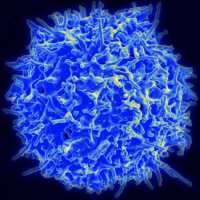The Cancer Survivors Network (CSN) is a peer support community for cancer patients, survivors, caregivers, families, and friends! CSN is a safe place to connect with others who share your interests and experiences.
Mesenteric lymph nodes - growing after stable for years
Hi everyone,
This is my very first post, so thank you in advance for reading. My husband recently found a palpable mass in his abdomen, and an ultrasound revealed that one of his mesenteric lymph nodes has grown. The largest measures 30mm. We’re currently waiting for an appointment with the haematology/oncology team, and his GP mentioned that a biopsy will likely be needed. Needless to say, the waiting and uncertainty are quite stressful. Some background: We first discovered his enlarged mesenteric lymph nodes back in 2016 during a routine test. Further investigations, including a biopsy at the time classified found it was benign. He had annual ultrasounds up until 2021, and the lymph node size remained stable (around 2.2cm), so he was told monitoring was no longer necessary However, last week, after feeling something unusual in the same area, we saw his GP, and upon an ultra sound we learned the node has grown to 3cm. We’re now back in a holding pattern while we wait to see a specialist, and I’m feeling understandably anxious. His routine blood reports are all fine.
I’m reaching out here to see if anyone has had similar experiences or insights. Has anyone dealt with stable lymph nodes that later changed? What kind of outcomes or next steps should we be mentally prepared for? Thank you so much. The waiting is the hardest part.
Comments
-
Hello bluesea, and sorry for your concern.
My experience has been technically different as I had no enlarged lymph nodes at all (was diagnosed with primary bone follicular lymphoma following a spontaneous pelvic fracture…), but given the duration of the "dormant" state of your husband's enlarged nodes, I would say that - if it turns out to be lymphoma - in all likelihood it would be an indolent ("slow-growing") type such as follicular lymphoma. Has your husband's doctor commented on the lymph node's structure?
The likely next steps, since you understandably ask what to expect, would be another biopsy, and then - if positive - a PET scan to stage it. A word of reassurance here: when it comes to lymphoma, a more advanced stage does not imply a dire outcome, as it often does in "solid" cancers. But, let's not get ahead of ourselves: for the time being, the diagnosis remains to be done, and not every case of enlarged lymph nodes turns out to be lymphoma.
The waiting part of the game never gets easier, but we need to keep in mind that this is why we are called "patients"… With relatively modest enlargement (30mm = 1.2 inch) of one lymph node and absent any rapid changes in your husband's general health, there is no need to rush things.
I hope this helps. Do keep us posted on your developments.
Kind regards,
PBL
-
Sorry to hear this. There. are many non-cancerous conditions which lead to enlarged lymph nodes. Simple infection - chronic low grade infection - can produce exactly this symptom. Auto-immune conditions, of which there are 75-80 known, can do the same. Sarcoidosis, for example, often mimics certain cancers. Therefore, it would seem that an entire lymph node should come out (we have hundreds of them) and be pathologically examined to produce the clearest picture of what is occurring.
By way of analogy, picture a lymph node as an orange, with peel, segments, stem and seeds. Nodes have a defined internal structure. Cancer will often alter (efface) this structure. Imagine peeling an orange only to find a mass of clay inside. That eould be consistent with a malignancy. A "reactive" lymph node is one that is doing its job in fighting infection. Even when enlarged, it will appear as a large lymph node with all internal structure in place.
So, some additional pathological work is needed to clarify the picture. One though I have been taught is 'He does not have cancer until a pathology report states that he has cancer." It can help to maintain peace of mind during the process.
Discussion Boards
- All Discussion Boards
- 6 Cancer Survivors Network Information
- 6 Welcome to CSN
- 122.7K Cancer specific
- 2.8K Anal Cancer
- 457 Bladder Cancer
- 313 Bone Cancers
- 1.7K Brain Cancer
- 28.6K Breast Cancer
- 407 Childhood Cancers
- 28K Colorectal Cancer
- 4.6K Esophageal Cancer
- 1.2K Gynecological Cancers (other than ovarian and uterine)
- 13.1K Head and Neck Cancer
- 6.4K Kidney Cancer
- 685 Leukemia
- 805 Liver Cancer
- 4.2K Lung Cancer
- 5.1K Lymphoma (Hodgkin and Non-Hodgkin)
- 243 Multiple Myeloma
- 7.2K Ovarian Cancer
- 71 Pancreatic Cancer
- 493 Peritoneal Cancer
- 5.7K Prostate Cancer
- 1.2K Rare and Other Cancers
- 544 Sarcoma
- 744 Skin Cancer
- 662 Stomach Cancer
- 194 Testicular Cancer
- 1.5K Thyroid Cancer
- 5.9K Uterine/Endometrial Cancer
- 6.4K Lifestyle Discussion Boards

